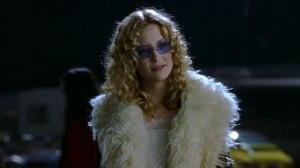Our Complicated Feelings About Etsy

“Don’t give your products stupid names” is one piece of advice from Alicia Shaffer, the entrepreneur (Etsy-preneur?) who runs the immensely profitable online store ThreeBirdNest. FastCo Design recently re-published its #longread profile of her, which I missed the first time around.
The shop’s 58 designs — including socks, leg warmers, boho scarves and lace headbands, as well as T-shirts that read “Feed Me And Tell Me I’m Pretty” — look like they might appeal to a certain type of kombucha-brewing earth mama, but they don’t scream million-dollar business. Prices range from $4 for a fabric cuff bracelet to $38 for a floral circle scarf. Many Etsy shop owners feel lucky to sell 10 pieces a month, and 65% of Etsy sellers make less than $100 from their shops in a year. Crafters usually need day jobs to support their hobbies. What accounts for ThreeBirdNest’s success? Is the shop secretly sewing methamphetamine into the seams of those lacy legwarmers? …
Shaffer has a team of 15 sewers — “all moms,” Shaffer says — working full-time, as well as a professional photographer. Shaffer’s husband was able to retire early from his job as a fire chief. Not all the items are entirely handmade by Shaffer’s team — many, like the knitted legwarmers, socks, and gloves, are sourced wholesale from India. “We finish them here, adding lace trimmings and buttons,” Shaffer says. The profit margin from such imported items is 65%.
I can buy knitted legwarmers made in India in various brick-and-mortar stores. Why should I look to Etsy for that?
I’m not the only one a bit puzzled by Etsy’s unique value proposition. MarketWatch points out that the “online marketplace must balance doing well and doing good,” especially now that “it is about to go public.”
As a Certified B company, Etsy ETSY, +0.00% belongs to a group of businesses that are socially conscious and, according to Etsy regulatory documents, “meet rigorous standards of social and environmental performance, accountability, and transparency,” similar to the Fair Trade certification on coffee. According to B Lab, the non-profit in charge of bestowing the Certified B qualification, which is not a legal entity, over 1,000 companies currently are Certified B corporations, including Ben & Jerry’s ice cream, now a unit of Unilever, and Rally Software RALY, +0.77%
Etsy, with 2014 annual revenue of $196 million, would become one of the largest Certified B companies to go public.
Though that revenue looks pretty impressive, and Etsy’s IPO values it at $1.8 billion (!), the site has not yet figured out how to be profitable.
Will you buy stock? Or, failing that, some knitted gloves that were made in India but hand-decorated by moms in the USA?
Support The Billfold
The Billfold continues to exist thanks to support from our readers. Help us continue to do our work by making a monthly pledge on Patreon or a one-time-only contribution through PayPal.
Comments